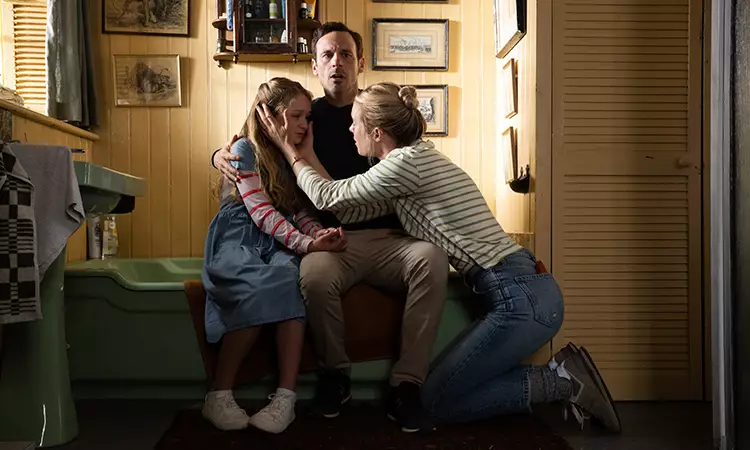In the realm of psychological thrillers, few narratives play as intricately with the nuances of human interaction as *Speak No Evil*. Set against a backdrop of picturesque country landscapes, the film explores the uncomfortable undercurrents of societal politeness and the tension that can arise in seemingly innocent encounters. As actor Scoot McNairy, who portrays the character Ben Dalton, articulates, the film forces audiences to confront their discomfort in social situations while simultaneously delving into dark psychological themes that emerge as the narrative progresses.
This film, which is produced by the renowned Blumhouse Productions and directed by James Watkins, initially presents an American family—consisting of Ben, his wife Louise (played by Mackenzie Davis), and their daughter Agnes—as they embark on a weekend getaway. However, this seemingly idyllic trip quickly spirals into a psychological minefield, unfolding a captivating tale that challenges viewers to examine the darker aspects of social etiquette.
At its heart, *Speak No Evil* serves as both a commentary on and a critique of social norms. McNairy notes that the film possesses elements akin to *The Office*, interspersed with moments of genuine horror. The comedic undertones juxtaposed against the film’s chilling moments underscore the absurdity of social expectations and the lengths individuals will go to maintain a façade of politeness. The discomfort experienced by the characters becomes a reflection of the viewer’s own experiences, prompting a deeper introspection of societal interactions.
The premise further deepens as the Dalton family becomes entangled with a seemingly charming British family—Paddy, Ciara, and their enigmatic son Ant. Viewers are compelled to question the dynamics of friendship and trust, particularly as they navigate the subtle manipulations that arise within these relationships. What initially appears as a harmless invitation escalates into a narrative laden with tension, further amplifying the central theme of social discomfort.
One of the film’s most significant themes revolves around toxic masculinity and its implications on personal relationships. McNairy’s character, Ben, finds himself juxtaposed against Paddy, portrayed by James McAvoy. This dynamic creates an engaging commentary on traditional gender roles, where the more sensitive and passive Ben encounters the domineering alpha-male persona embodied by Paddy. This tension reveals broader societal issues surrounding masculinity, and McNairy’s reflections on his upbringing touch upon the spectrum of masculinity and its various representations.
The structure of the Dalton family’s relationship poses questions of compromise and sacrifice. Davis articulates Louise’s struggles, as she grapples with her own desires and the necessity of maintaining her marriage amid their strife. The film suggests that often, the endurance of discomfort can stem from a desire to uphold familial bonds, even when faced with unsettling situations. This complex depiction of gender dynamics is essential in understanding the motivations behind the characters’ choices, and further complicates the narrative.
As the plot unfolds, it becomes evident that the film transcends conventional horror tropes, delving into societal fears that are more psychological than physical. McNairy believes that modern horror has shifted to explore internalized fears—an evolution reflecting our anxieties in a rapidly changing world. This conceptual shift moves horror away from just external threats, focusing instead on the psychological unraveling that can occur within the human psyche.
Davis echoes this sentiment, suggesting that the backdrop of traditional horror allows filmmakers to approach serious societal issues without causing viewers to disconnect from the narrative. By masking deeper themes within the infrastructure of a horror film, audiences are more receptive to engaging with challenging topics. This fusion of entertainment with meaningful reflections on society fosters a unique viewing experience that leaves audiences contemplating the unsettling realities of their own lives long after the credits roll.
*Speak No Evil* exemplifies how psychological thrillers can effectively illuminate the complexities of human interaction while simultaneously exposing underlying societal issues. By pushing the boundaries of horror, the film invites viewers to contemplate not just the terror that lurks within its narrative, but also the disquiet that resides within themselves. As both McNairy and Davis have articulated, this film offers more than mere fright; it serves as a psychological exploration of the fears and discomforts that define modern interpersonal relationships. In doing so, *Speak No Evil* may resonate as a haunting reflection of the human experience, challenging audiences to confront what lies beneath the surface of their everyday interactions.

